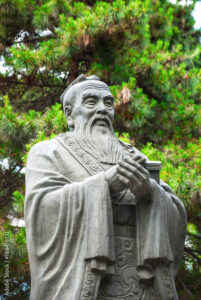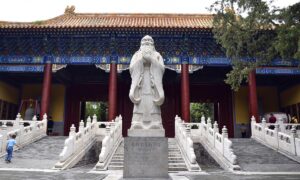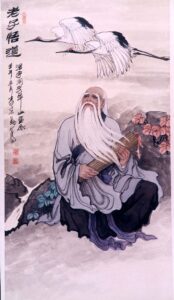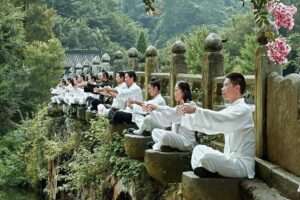 “Though closer to a philosophy than a true religion, Confucianism was a way of life for ancient Chinese people, and it continues to influence Chinese culture today. The founder of Confucianism, whose name was Confucius, lived from 551 to 479 B.C.E. He was a philosopher and political figure who lived during a time when traditional Chinese principles began to deteriorate under competing political states.
“Though closer to a philosophy than a true religion, Confucianism was a way of life for ancient Chinese people, and it continues to influence Chinese culture today. The founder of Confucianism, whose name was Confucius, lived from 551 to 479 B.C.E. He was a philosopher and political figure who lived during a time when traditional Chinese principles began to deteriorate under competing political states.
 He took older religious precepts and translated them into guidelines for social mores. His teachings gave guidance on all levels of ancient Chinese life, from interactions between family members and in the public sphere to educational standards and how states should be governed.
He took older religious precepts and translated them into guidelines for social mores. His teachings gave guidance on all levels of ancient Chinese life, from interactions between family members and in the public sphere to educational standards and how states should be governed.
 Taoism (also called Daoism) is a Chinese religion that developed a bit after Confucianism, around two thousand years ago. In contrast to Confucianism, Taoism is mainly concerned with the spiritual elements of life, including the nature of the universe.
Taoism (also called Daoism) is a Chinese religion that developed a bit after Confucianism, around two thousand years ago. In contrast to Confucianism, Taoism is mainly concerned with the spiritual elements of life, including the nature of the universe.
Taoism (also spelled Daoism) is a religion and a philosophy from ancient China that has influenced folk and national belief. Taoism has been connected to the philosopher Lao Tzu, who around 500 B.C.E. wrote the main book of Taoism, the Tao Te Ching. Taoism holds that humans and animals should live in balance with the Tao, or the universe. Taoists believe in spiritual immortality, where the spirit of the body joins the universe after death.
 The guiding principle of Taoism is roughly translated as ‘the Way,’ which is a harmonious natural order that arises between humans and the world, and that Taoists should strive to achieve. In the Taoist structure of the universe, humans are meant to accept and yield to the Tao and only do things that are natural and in keeping with the Tao.
The guiding principle of Taoism is roughly translated as ‘the Way,’ which is a harmonious natural order that arises between humans and the world, and that Taoists should strive to achieve. In the Taoist structure of the universe, humans are meant to accept and yield to the Tao and only do things that are natural and in keeping with the Tao.
This is the concept of wu-wei, which translates as ‘non-action,’ but really means to go with the true nature of the world and not strive too hard for desires. The Tao Te Ching and other Taoist books provide guides for behavior and spiritual ways of living in harmony with this energy.
This puts Taoism in opposition to Confucianism in another way: it is not concerned about with humanistic morality, government, and society, all of which Taoists see as inventions of humans and not necessarily part of the Tao. At the same time, Taoists were interested in longevity, both of the human body and the soul. Achieving spiritual immortality through becoming one with nature is an important part of the Taoist religion.”
nationalgeographic.org